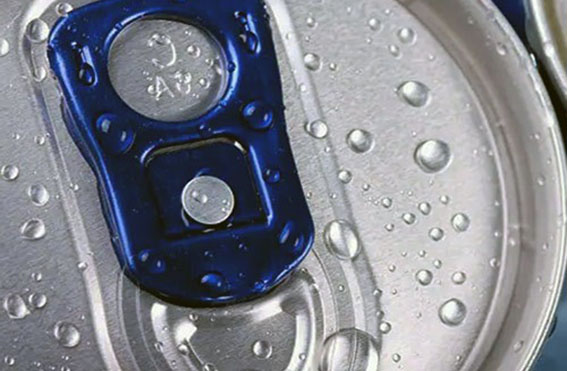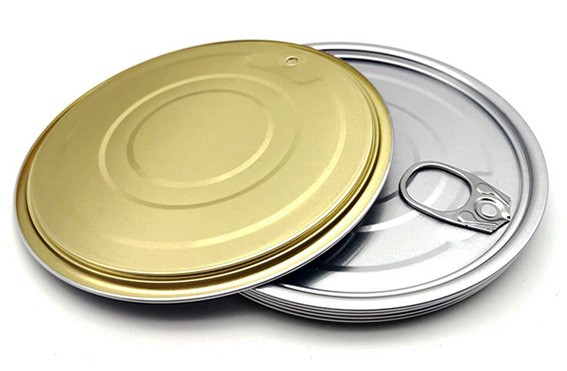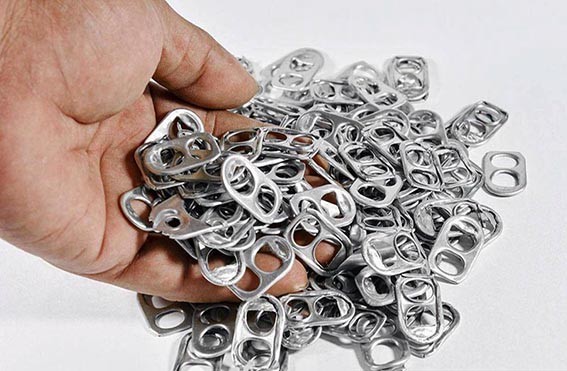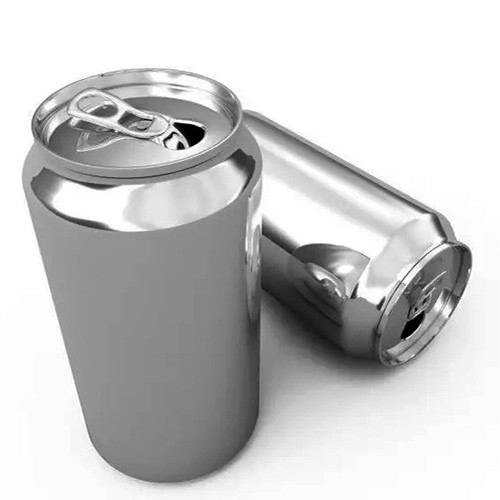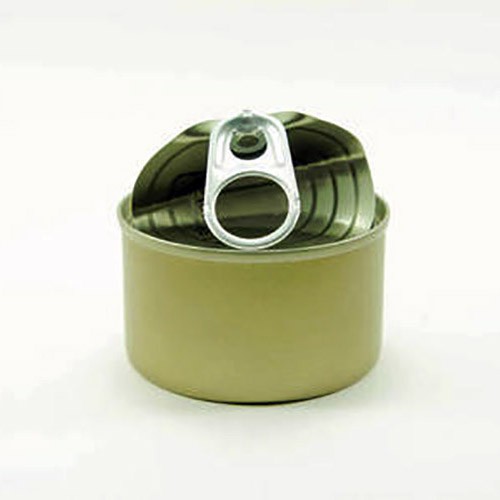Beverage can lids usually use two aluminum alloys, 5182 and 5052. Both aluminum alloys offer excellent formability, corrosion resistance and weldability, making them ideal for making can lids.
- 5182 aluminum alloy: 5182 aluminum alloy is superior to 5052 in strength, so it is often used to manufacture beverage can lids with internal pressure. This alloy is able to withstand internal pressure, maintain the shape and performance of the can lid, and ensure the safety of the beverage inside.
- 5052 aluminum alloy: Although the strength of 5052 aluminum alloy is slightly lower than 5182, it still has good formability and corrosion resistance. Therefore, it is often used to manufacture beverage and food can lids without internal pressure. These lids do not withstand internal pressure and have low strength requirements.
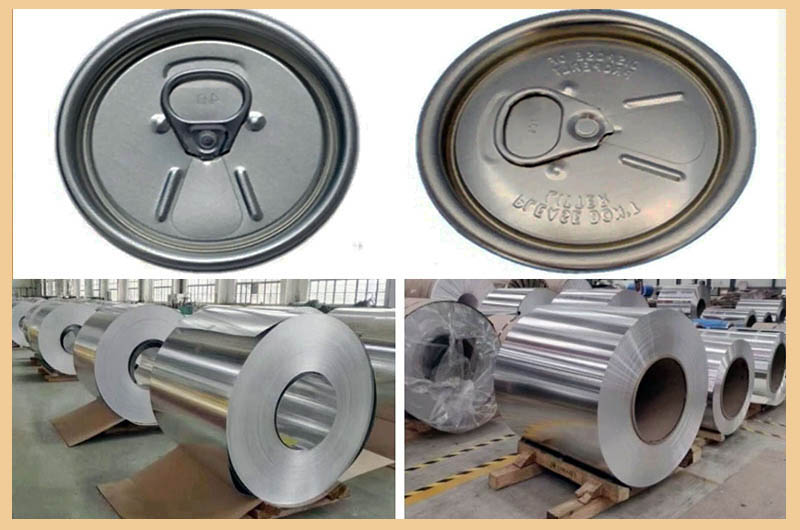
Taking into account factors such as the use environment, functional requirements, and manufacturing costs of beverage can lids, selecting the appropriate aluminum alloy is crucial to ensuring the quality and performance of the can lid.
5182 5052 H48 aluminum coil is a common aluminum alloy material and is widely used in the manufacture of lids for beverage cans. This aluminum alloy is popular mainly due to its superior formability and corrosion resistance. Formability refers to its ability to be easily molded into the desired shape during processing without cracking or deformation. This makes the manufacturing process more efficient and ensures the consistency and quality of can lids.
Corrosion resistance is an important consideration for can lids. Beverage can lids are often exposed to moisture and therefore must have good corrosion resistance to prevent rust or other forms of corrosion. 5182 5052 H48 aluminum alloy has excellent corrosion resistance and is able to maintain its appearance and performance for a long time, ensuring the safety and hygiene of packaged foods.
5182 5052 H48 aluminum coil is produced through a series of processes such as casting, rolling and heat treatment to produce high-quality products with specific mechanical properties.
5182 5052 H48 aluminum coil suitable for can lids
- 1. Corrosion Resistance: 5182 5052 aluminum is naturally resistant to corrosion, making it an ideal material for can lids that are often in contact with moisture.
- 2. Formability: 5182 5052 aluminum alloy has excellent formability and can be easily formed into can lids without cracking or losing structural integrity.
- 3. Strength: The H48 condition indicates that the aluminum has undergone a strain hardening and stabilization process that enhances its strength, making it suitable to withstand the pressures and stresses encountered during the canning process and transportation.
- 4. Weldability: 5182 5052 aluminum is highly weldable, allowing for an efficient manufacturing process when forming can lids.
- 5. Recyclability: Aluminum is highly recyclable, making it an environmentally friendly choice for packaging materials such as can lids.
- 6. Cost-effectiveness: While aluminum may initially be more expensive than some other materials, its durability, recyclability and other properties can lead to long-term cost savings in production, transportation and environmental impact.
5182 5052 H48 Aluminum Coil for Can End Specification
- Alloy: 5182 5052
- Temper: H48
- Thickness: 0.28-0.38mm
- Width: 20-2600MM
- I.D 75mm, 150mm, 505mm
- Surface: MILL FINISH
- Application: Tin Can Ring
- Standard: ASTM B209
- Coating color: Gold, Silver, Transparent
Deviation in dimensions for 5052 5182 aluminum sheet coils for can lid
Dimensional deviations for 5052 and 5182 aluminum sheet coils used for can lids generally comply with industry standards and specifications. These deviations include tolerances on thickness, width and length.
- Thickness: 5182 5052 The thickness deviation of aluminum coils is usually specified in terms of tolerance limits. For example, the standard tolerance for aluminum coils might be ±0.005 inches (0.127 mm) or as per customer requirements.
- Width: The width tolerance specifies the allowable deviation from the nominal width of the roll. This tolerance may vary based on manufacturing processes and customer specifications. It is usually expressed as a percentage of the nominal width.
- Length: The length tolerance refers to the allowable deviation of the coil from the specified length. Like width tolerance, it may vary based on factors such as manufacturing processes and customer requirements.
For 5052 and 5182 aluminum sheet coils used for can closures, Haomei Aluminum closure material suppliers try to minimize these dimensional deviations to ensure consistency and meet customers' specific needs.
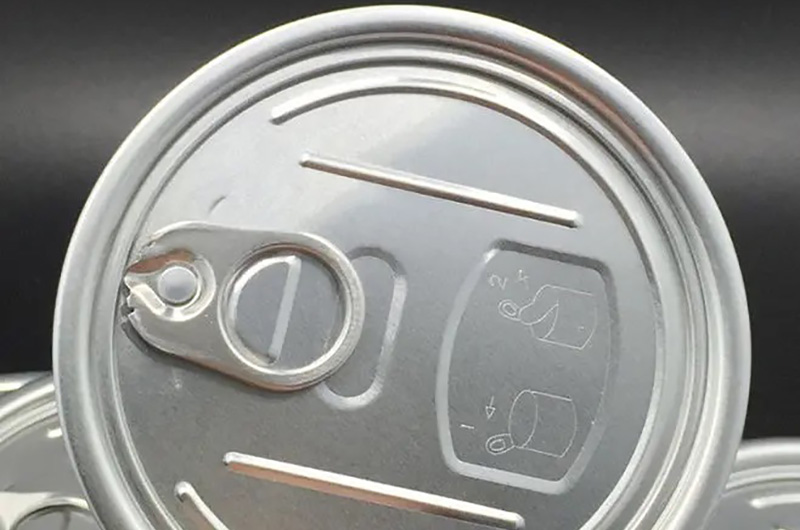
Can lids coated with 5052 5182 H48 aluminum sheets and coils
1.Epoxy resin coating for 5052 5182 H48 aluminum plate coil
Material: epoxy phenolic resin
Function: Provide excellent corrosion resistance and chemical resistance to ensure that the can lid will not corrode or chemically react when storing liquid food for a long time.
Coating thickness: usually between 5-15 microns.
2.DOS oil coating for 5052 5182 H48 aluminum plate coil
Coating material: DOS oil coating is usually an oil-based coating composed of dimethylnitrosamide (Dioctyl sebacate) and other additives.
Effect:
Anti-corrosion: DOS oil coating can form a protective oil film to effectively prevent oxidation and corrosion on the surface of aluminum plates.
Improve surface finish: DOS oil coating can fill in the tiny depressions and unevenness on the surface of the aluminum plate, improving the surface finish and appearance.
Lubricity: DOS oil coating has certain lubricity, which helps reduce friction and wear during the manufacturing process.
Coating thickness: The thickness of DOS oil coating is usually thin, generally between a few microns and tens of microns. The specific coating thickness can be adjusted according to actual needs.
5182 5052 H48 Aluminum Coil for Can End Chemical Composition Limit
5182 5052 H48 aluminum is the product of 5182 5052 alloy aluminum being tempered to the H48 state through a heat treatment process. This heat treatment process increases the strength of the alloy. 5182 5052 H48 aluminum alloy has the same composition as 5182 5052 alloy and has not changed.
| Element | Chemical composition (%) | |
| 5182 | 5052 | |
| Si | 0.2 | 0.25 |
| Fe | 0.35 | 0.4 |
| Cu | 0.5 | 0.1 |
| Mn | 0.0-0.5 | 0.1 |
| Mg | 4.0-5.0 | 2.2-2.8 |
| Cr | 0.1 | 0.15-0.35 |
| Ni | - | - |
| Zn | 0.25 | 0.1 |
| Ti | 0.1 | - |
| Al | Remainder | Remainder |
5182 5052 H48 Aluminum Coil for Can End Physical properties
| Alloy Temper | 5052 H48 | 5182 H48 | ||
| Thickness/mm | >0.220 -0.300 | >0.300-0.500 | >0.220 -0.300 | >0.300-0.500 |
| Tensile Strength Rm/MPa | ≥270 | ≥270 | 330 | ≥330 |
| Tensile Strength/MPa | ≥210 | ≥210 | ≥285 | ≥285 |
| Elongation % | ≥2 | ≥3 | ≥3 | ≥4 |
5182 5052 H48 Aluminum Coil for Can End Applications
5182 aluminum alloy is usually more suitable for beverage can lids loaded with internal pressure, such as carbonated beverage can lids.
5052 aluminum alloy is more suitable for loading beverage can lids without internal pressure, such as bottled water can lids or juice can lids.
5182 H48 Aluminum Coil for Can End Applications
- Carbonated drink can lid: Used to seal the top of carbonated drink cans to keep the drink fresh and bubbles.
- Juice jar lid: Used to seal the top of the juice jar to protect the juice from external contamination.
5052 H48 Aluminum Coil for Can End Applications
- Bottled water can lid: Used to seal the top of bottled water to ensure the cleanliness and hygiene of the water.
- Coffee can lid: Used to seal the top of the coffee can to keep the coffee fresh and aromatic.
Quality requirements for 5052 5182 H48 aluminum coils for can lids
1. Mechanical properties
Tensile strength: Generally required to be within a suitable range to ensure that the can lid has sufficient strength.
Yield strength: Appropriate yield strength is required so that the can cover can maintain its shape and avoid deformation when stressed.
2. Surface quality
Smoothness: The surface should be smooth without defects such as bumps and wrinkles to ensure the sealing of the can lid.
Smoothness: The surface should be smooth without obvious scratches, oxidation and other defects to ensure the appearance quality of the can lid.
3. Chemical composition: The chemical composition of aluminum coils is required to comply with relevant standards and requirements to ensure its performance stability and reliability during the manufacturing process.
4. Dimensional accuracy: The dimensional accuracy of aluminum plate coils is required to meet the requirements to ensure the accuracy and consistency of the manufacturing and assembly of can lids.
5. Surface treatment: Depending on specific requirements, surface treatment, such as anodizing, coating, etc., may be required to improve the corrosion resistance and appearance quality of the aluminum plate.
6. Corrosion resistance: Aluminum coils used for sealed containers such as can lids are required to have good corrosion resistance and be able to maintain good performance when storing liquids such as food for a long time.
7. Side curvature: The curvature of the product on any side of 2000mm length should not exceed 0.5mm. This ensures the product's smooth appearance and shape stability.
8. Crimping: When cutting products below 1500mm, the crimping height should not exceed 5mm. This helps reduce product waste and improve cutting accuracy.
9. Seams: 5182 5052 Aluminum base tape should not have seams, while coated tape rolls can have at most one seam. Seam control can ensure product consistency and quality stability.
10. End face: The end face should be neat and tight, without loose layers. The misalignment should not exceed 2mm, and the tower shape should not exceed 5mm. There should be no obvious burrs on the edges. These requirements ensure the appearance quality and safety of the product.

